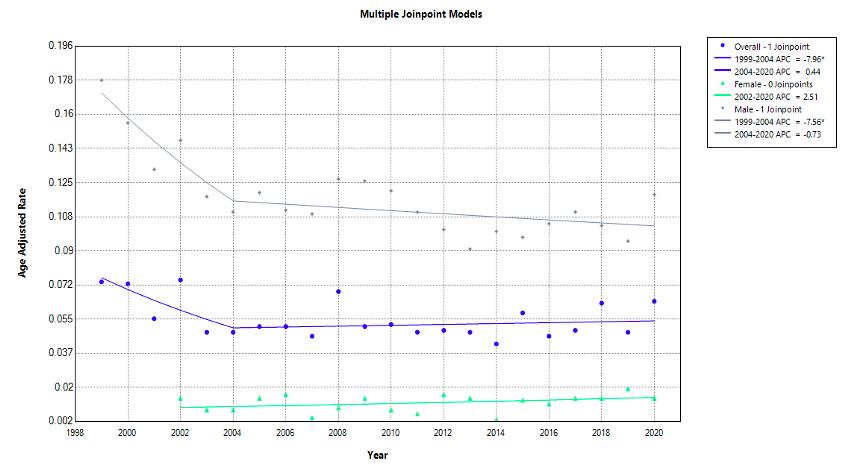Session Information
Date: Monday, October 27, 2025
Session Type: Poster Session B
Session Time: 10:30AM-12:30PM
Background/Purpose: Ankylosing spondylitis is a significant cause of mortality and morbidity in the United States (US), with a prevalence of 0.2%–0.5%. However, trends in mortality among patients with ankylosing spondylitis in the US remain unclear. Therefore, we aim to analyze mortality trends in patients with ankylosing spondylitis in the US from 1999 to 2020, stratified by year, sex, and rural-urban status.
Methods: Age-adjusted mortality rates (AAMR) per 100,000 individuals were obtained from the Centers of Disease Control and Prevention WONDER database from the years of 1999-2020. Joinpoint regression was applied to calculate the annual percentage change (APC) to evaluate significant differences in the change of AAMR over time.
Results: A total of 4405 deaths occurred in patients with Ankylosing Spondylitis from 1999 to 2020. The AAMR declined from 1999 to 2004 (APC -7.96 [-23.02, -1.43]) and remained stable from 2004 to 2020 (APC 0.44 [-0.95, 8.57]). Among females, AAMRs were stable from 2002 to 2020 (APC 2.51 [-0.99, 6.68]). Among males, the AAMR declined from 1999 to 2004 (APC -7.56 [-18.71, -2.31]) and remained stable from 2004 to 2020 (APC -0.73 [-1.76, 4.68]). The AAMR in urban areas declined from 1999 to 2004 (APC -9.46 [-25.62, -1.70]) and remained stable from 2004 to 2020 (APC 0.69 [-0.99, 9.63]). In rural areas, the AAMR declined from 1999 to 2012 (APC -3.60 [-11.60, -1.57]) and then increased from 2012 to 2020 (APC 4.01 [-0.001, 18.745]).
Conclusion: From 1999 to 2020, ankylosing spondylitis mortality initially declined but later plateau. Mortality rates remained constant in females and urban areas, while rural areas had increased mortality after 2012. These potential disparities warrant further research into quality of care delivered and phenotype of disease based on sex and rural status.
 Annual Percentage Change in Ankylosing Spondylitis-Related Mortality by Year and Gender
Annual Percentage Change in Ankylosing Spondylitis-Related Mortality by Year and Gender
.jpg) Annual Percentage Change in Ankylosing Spondylitis-Related Mortality by Urban Status
Annual Percentage Change in Ankylosing Spondylitis-Related Mortality by Urban Status
To cite this abstract in AMA style:
Thimmannagari S, Cooper S, Khanfar A, Khairani C. Ankylosing Spondylitis Related Mortality Trends in USA from 1999-2020: Analysis of CDC Wonder Database [abstract]. Arthritis Rheumatol. 2025; 77 (suppl 9). https://acrabstracts.org/abstract/ankylosing-spondylitis-related-mortality-trends-in-usa-from-1999-2020-analysis-of-cdc-wonder-database/. Accessed .« Back to ACR Convergence 2025
ACR Meeting Abstracts - https://acrabstracts.org/abstract/ankylosing-spondylitis-related-mortality-trends-in-usa-from-1999-2020-analysis-of-cdc-wonder-database/
